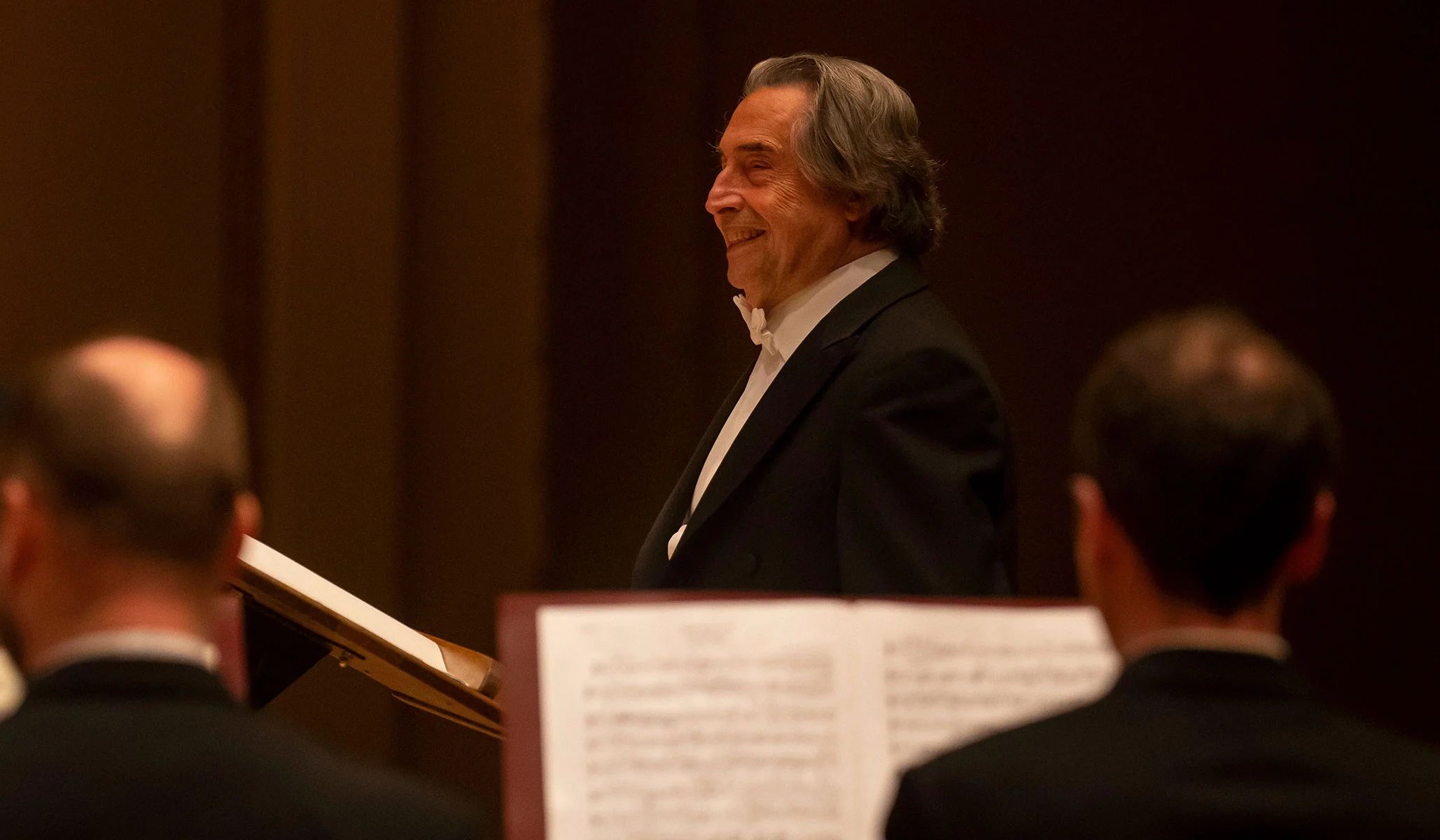Editor’s Note: The following is an expanded version of an article published in the current issue of National Review.
Chicago
When most people think of a conductor, they think of Riccardo Muti. He embodies the popular image of a conductor in his demeanor, knowledge, charisma, and longevity. Born in 1941, he has conducted orchestras all over the world and has remained consistent in his approach to conducting. I have been observing and listening to Muti since 1980, when he became the music director of the Philadelphia Orchestra.
During that time, the Philadelphians adopted the slogan “Tutti per Muti” (“Everyone for Muti”), which was emblazoned on various items like T-shirts and coffee mugs. Although the phrase doesn’t rhyme in proper Italian, as Muti himself confirmed, it was meant to express support and admiration.
Since 2010, Muti has held the position of music director with the Chicago Symphony Orchestra. However, his tenure in Chicago is coming to an end. This doesn’t mean he will never conduct the orchestra again; he will be conducting them next season, including the opening night at Carnegie Hall in New York. But he will be stepping down from his role as music director.
After a recent concert in Chicago, I had the opportunity to sit down with Muti in his studio at Orchestra Hall. The walls of the studio are adorned with photos and memorabilia that tell the story of his life.
Among the photos, there is one of the place in Naples where Muti was born. There are also pictures of Toscanini, an iconic Italian conductor, as well as Muti’s beloved teachers, Nino Rota and Antonino Votto. Rota is best known for his music for The Godfather, while Votto served as Toscanini’s principal assistant at La Scala.
On a table in the studio, I notice a small bust and mention “Verdi.” Muti responds solemnly, “Always. Always.” Muti has had a deep connection with the composer throughout his career.
Another notable photo on the wall is one of Muti with Queen Elizabeth II and Prince Philip. The queen attended a performance at La Scala in 2000 when Muti was the music director there. Instead of Muti going to the royal box, the queen came backstage to meet him.
When Muti tells me this story, I remark, “The mountain came to Mohammed.” He corrects me, saying, “To the mouse.”
There is also a framed letter from Muhammad Ali, in which the boxing champion refers to music as “the heartbeat of the universe” and tells Muti, “You are the greatest and so am I.”
Muti comments, “Bellissimo, no? Commovente” (meaning “Beautiful, isn’t it? Moving.”)
Another striking photo on the wall is one of the Castel del Monte in Apulia, built by King Frederick II in the 1240s. Muti first saw the castle when he was five or six years old, and it left a lasting impression on him. He always wanted to buy a piece of land near it so he could retire there and gaze upon it. And that is exactly what he has done.
Last season, Muti conducted Philip Glass’s Symphony No. 11. He shared with Glass his intimate association with Castel del Monte and asked the composer to write a piece for him to conduct next season. While Muti hasn’t seen the score yet, he knows the title of the piece Glass will deliver: “The Triumph of the Octagon.”
On this particular afternoon, Muti conducted a program that began with Mozart and ended with Respighi. The Respighi piece was Pines of Rome, the second part of the composer’s Roman Triptych. Muti quotes Horace, saying, “Alme Sol, possis nihil urbe Roma visere maius” (meaning “Kind Sun, may you look upon nothing greater than the city of Rome”). He also mentions a conversation he had with Respighi’s widow, Elsa, in Milan. She lived until the age of 101 and was just a week shy of her 102nd birthday.
The final section of Pines of Rome, known as “The Pines of the Appian Way,” was performed brilliantly by Muti during the concert. Surprisingly, his gestures on the podium were relatively small, even though technically, all he had to do was beat in four for five minutes. Muti expresses his disdain for conductors who make exaggerated movements on the podium, calling them “clowns” and emphasizing the importance of smaller gestures in conducting.
Muti points out that Fritz Reiner, one of his predecessors in Chicago, was known for his small gestures, yet he was able to extract incredible performances from the orchestra.
The concert began with Mozart’s divertimento in F major, K. 138, written when the composer was just 16 years old. During our conversation, I mention a musician who once said, “When I get to heaven, the first thing I’ll ask is, ‘Where’s Mozart?’” Muti has worked closely with many composers throughout his career, but he feels a special connection to Mozart and Verdi. When asked if he would like to meet them and ask them questions, Muti replies that he doesn’t think he will meet them in heaven because he doesn’t believe he will go in that direction. Furthermore, he admits he would be afraid to ask them questions because if they were to tell him he got it all wrong, he would feel like he died a second time.
According to Muti, Mozart and Verdi are similar in that their operas speak to the human condition. They portray our qualities, both good and bad, without passing judgment. They reveal who we are, often exposing our shortcomings.
During our conversation, I bring up the heavenly trio “Soave sia il vento” from Mozart’s Così fan tutte. Muti reveals that he has asked his family to play this trio at his funeral, using a recording of him conducting it.
Muti has conducted a significant amount of new music throughout his career, including American compositions. He notes that while no one in Italy pushes him to conduct new Italian music and the same goes for new Dutch music in Holland, there is a prevailing sentiment in America that conductors should do more American music. Muti sees this as a sign of an inferiority complex among American composers. He quotes Robert Schumann, who compared composers to shoemakers. In Mozart’s time, composers made shoes that everyone could wear, but in the present day, they make shoes that only some can wear. Muti wonders about the state of music today and the lack of connection between modern classical music and public taste. He believes that composers have not given people much music to warm to or remember, resulting in a divide between overly cerebral and abstract classical music and increasingly shallow popular music.
Muti also expresses his frustration with opera productions, particularly the influence of stage directors. He notes a peculiar dichotomy where some people insist on historical accuracy in the pit, with “authentic” performances using “original” instruments and period practice. However, on the stage, anything goes, no matter how far removed it is from the original setting of the opera.
I mention a recent production of Verdi’s Rigoletto at the Metropolitan Opera, set in 1960s Las Vegas during the time of the Rat Pack. While the production had some interesting and imaginative elements, I argue that an opera set in 1960s Las Vegas is a great idea, but it should be a new opera specifically written for that setting, not a reinterpretation of Rigoletto, which is set in 16th-century Mantua.
Muti agrees, highlighting the discrepancy between the Renaissance dance music at the beginning of Rigoletto, which belongs to the court of that time, and the setting of 1960s Las Vegas. He also criticizes productions that depict Rigoletto without his hunchback, as it is a crucial aspect of the character and the story. Muti believes that opera requires a suspension of disbelief, but certain elements must remain true to the story for it to make sense.
Towards the end of our conversation, we discuss the concept of cultural decline. Muti acknowledges that every generation tends to view the society and culture around them as in decline, but he sees signs of decline in our modern era. He attributes part of the problem to a lack of knowledge and appreciation for the past, including our artistic heritage. Muti believes that without roots, a tree will fall, and he feels a responsibility to fight against this decline, even if it means making small contributions.
Next May, Muti has a special engagement in Vienna where he will conduct the Vienna Philharmonic Orchestra for the 200th anniversary of Beethoven’s Ninth Symphony, which premiered in Vienna. He is deeply moved by this opportunity, as an Italian conductor being chosen for such an important milestone. To Muti, music transcends nationality.
Throughout our hour-long conversation, Muti shares anecdotes about various personalities he has encountered, including popes like Paul VI and Francis. He praises Benedict XVI as a wonderful musician. Muti also recalls his interactions with film directors such as Ingmar Bergman and Federico Fellini. He once asked Fellini to direct an opera for him, but the director declined, stating that he preferred spoken word over sung word.
Muti concludes our conversation by reflecting on his career and the immense responsibility that comes with being a conductor. He admits that he has never gone to the podium thinking, “Oh, I’m so happy to conduct a concert.” Instead, he feels a tremendous weight of responsibility when standing in front of the composer, the music, the orchestra, and the audience. Even after a successful performance, Muti is always thinking about what he could have done better.
He shares a story about Toscanini, who, despite his vast experience and knowledge, would still search through the score of La traviata before a rehearsal, trying to find ways to do the opera justice. Muti chuckles as he recalls a story about Toscanini and Piatigorsky, where the conductor, feeling insecure, tells the cellist, “We are no good, but the others are worse. Come on, dear fellow, let’s go.”
As we part ways, Muti reflects on the torment that comes with taking his profession seriously. He explains that conducting is a lifelong struggle, and he has always approached it with a sense of responsibility and seriousness. Muti understands that his role as a conductor is to serve the composer, the music, the orchestra, and the audience. He believes that even a single drop can make a difference, and he will continue to fight for the preservation and appreciation of music.

